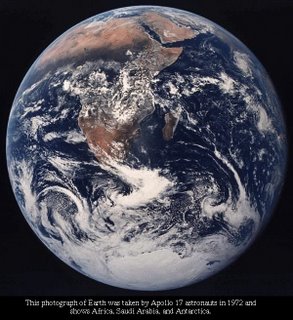Our homes are full of the latest gadgets, our wardrobes overflow with clothes rarely worn and we replace perfectly serviceable TVs, Hi-Fis and other appliances with newer models and then discard the old ones to pollute land and water.
All the things we collectively purchase require the consumption of raw materials in ever increasing quantities; the energy to produce and deliver them to us comes overwhelmingly from non-renewable sources and our economic way of life and standards of living depend upon a cycle of constant growth, increased demand, more production, more energy, more waste.
Is this way of life sustainable? In the short-term perhaps, in the long-term almost certainly not.
If western patterns of consumption are matched by the fast growing Indian and Chinese economies there simply wouldn't be enough oil and other raw materials to go around. Daily demand for oil from China alone would outstrip current worldwide daily production within the foreseeable future. All modern and developing economies are based on, and driven by, oil and natural gas; but these finite resources will , despite all the oil sands in Canada, run out one day.
And if a huge body of scientific opinion is correct our seemingly insatiable demand for more and more and our selfish disrespect for the natural world around us is causing global warming to increase at an unprecedented rate.
A handful of British MPs have recently called for radical measures to be taken; in effect for people to be forced to consume less to help to save the planet. The logic being, consume less, produce less, burn less fossil fuel, reduce greenhouse gases, and slow down or reverse global warming and hopefully save the planet for future generations to enjoy.
A concept doomed to failure however. Consuming less would mean less production, fewer jobs, less income, lower standards of living, less tax and fewer public services such as health provision leading to a downward spiral of relative impoverishment which few of us in the west could contemplate let alone volunteer for.
And even if the population of the UK were prepared to make such sacrifices the effect on the world's climate would be negligible and the effect on living standards would be immense. Only if all major economic countries in the world could agree to a mass reduction of material consumption would there be any possibility to reverse any man made global warming. Is that likely? Of course not, it's a Utopian fantasy. National and individual self-interest would prevail and those of us privileged enough to afford foreign travel for example will still take to the skies in ever increasing numbers, flying over diminishing natural habitats on our way to exotic destinations, until the fuel finally runs out.
If man-made global warming theories prove correct and our economies and civilizations do eventually break down as fossil fuels run out, and modern oil driven agricultural systems collapse, and high seas and storm surges fed by the melting ice caps of Greenland and Antarctica, overwhelm sea defences and flood major cites and prime agricultural land on coastal plains; then the people best able to survive will be the meek amongst us who today scratch a meagre living from the same Mother Earth we collectively seem hell bent on destroying.

No comments:
Post a Comment